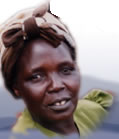THEMES IN THIS
TESTIMONY
Culture and Customs

Gender

Health

Click on arrows
to find more
testimonies
featuring
these themes
|
|
Sex
|
Male
|
|
|
Age
|
39
|
|
|
Identity
|
Bukusu
|
|
|
Occupation
|
Farmer
|
|
|
Location
|
Chepkuyi, Kibuk
|
|
|
Date
|
1997
|
|
summary
This interview is quite revealing on relations between the sexes, and also presents an alternative view on the clashes. The narrator states firmly at one point that they were political in origin. The discussion of how attitudes to adultery have changed with the advent of HIV/AIDS is especially interesting, while his frank comments on wife beating are quite revealing about the status of women in the community. There is also an interesting description of why the Bukusu took up the practice of circumcision, as well as of the ceremony itself.
detailed breakdown
|
You will need a password from Panos to view the full
transcript of the interview. To apply for a password, click here.
Once you have a password, click here to go to the beginning
of the transcript. You can also click on any section of the
breakdown of content below and go straight to the
corresponding part of the transcript.
|
| Section 1-3 |
Growing up in a polygamous family. Eating customs within the family and in Bukusu society generally.
|
| Section 3-4 |
Marital relations - how both his and his wife’s families play a role in sorting out differences between them. Nevertheless states that the “longer we lived together, the less the differences became”. Yet admits he beats his wife: “Sometimes, a woman can do mistakes that she does not acknowledge quickly. So you are forced to beat her for her to accept her mistakes.”
|
| Section 4-5 |
How according to Bukusu tradition, every wife must have her own piece of land (shamba). Comment on how more land is under cultivation now: “...they never used to cultivate swampy areas, unlike today when they have realised the importance of these parts and they dig and plant sugar cane, and vegetables during the dry season.” Describes how he took care of animals as a boy and what games he used to play.
|
| Section 5-7 |
Circumcision amongst the Bukusu: tells the story of how it began (linked to marriage with the Sabaot). The tale of heroism and bravery is meant to inspire the initiates with courage. Says “when you are not circumcised, you look like a goat among the sheep”.
|
| Section 7-8 |
How girls are taught about their future adult roles, to do well in school and to be good wives. Describes the division of labour on the land: men dig and plough, and women plant the seeds. Weeding used to be done communally, but now that plots are smaller it is done by each individual family.
|
| Section 8-9 |
Talks about a decline of respect for the elder generation among the youth.
Describes how adultery used to be dealt with “like business”, with the husband being compensated in livestock, because it didn’t used to matter how many sexual partners a woman had: “The Bukusu understand that a woman is just like a river....They say that if you go with a spear and plunge it in the riverbed, there will be no mark or difference”. The narrator says attitudes to adultery have changed, though, because of fear of HIV/AIDS.
|
| Section 9-10 |
How the narrator came to marry. Rejected one potential wife because heard that her family “practise witchcraft”.
|
| Section 10-11 |
Discussion of the clashes: “The main cause of these clashes was never known or understood. Though a District Commissioner by the name Samuel Chang'ole was heard telling his people the Sabaot, to “separate the maize from the beans”. We did not comprehend its meaning till the clashes begun. The Sabaot started eliminating the Bukusu, Teso and other tribes- Abagusii, Luos, Kikuyu and Merus, all those who used to work here in the forest.” But then he says that “even the recent [clashes] were political”. How ActionAid has helped rehabilitate the narrator and others who lost property in the clashes.
|
|


